#people often use fiction as a means of exploring or explaining our world in a way that can be more digestible to the viewer
Note
i find people who include fantasy racism, sexism and homophobia in their rewrites for ‘added drama’ and ‘issues’ are extremely unoriginal and lacking creativity. if your go to conflict is always fascism just because you have no creativity to try and come up with anything else besides what you know and is obviously ingrained in your brain, you should sit down and think why your go to awnser is always fascism.
.
#ooookay#so uh#I can understand this sentiment when directed at ppl who have no expierence being discriminated against in a particular way#and still write a story abt that discrimination#like a white person adding fantasy racism to their story#however#people often use fiction as a means of exploring or explaining our world in a way that can be more digestible to the viewer#and gay person creating a fantasy story thay focusses on a world with homophobia and how that impacts those living in it#is not adding it for 'drama'#they are commentating on the state of our world which has homophobia#maybe someone's first way to explore conflict in a story is via bigotry because they have expierenced bigotry so often in their life#they view it as one of the major driving forces in their circumstances or perspective#to belittle writing that depicts real world issues as 'adding drama' shows to me that there is a lack of reading comprehension on your part#if your first instinct when faced with a story that includes an oppressed class being oppressed is 'stop add drama'#I think you need to reevaluate some things#one the number one pieces of writing advice you hear is 'write what you know'#who are u to say someone should be more 'creative' than that#aphmau confessions#aphmau#aphblr#aphverse#fandom angies#angies#instead of being mad maybe consider WHY an author may choose to add those things to a story#maybe u want fiction for escapism and that's why it bothers you#but not everyone goes to fiction for that purpose#sometimes they want to vent issues via a story or explain to someone why smth is a problem while excluding as much bias as possible#hence the fantasy setting and depiction of oppression#🤭
11 notes
·
View notes
Text
Shangri-La Frontier mid-season review
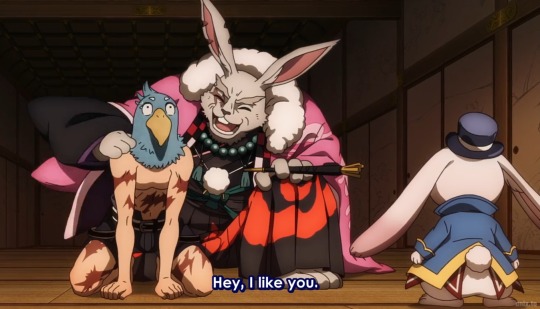
This is by far the best fake video game I've ever seen written in fiction.
Most MMO-centric isekai stories have trouble with providing accurate and realistic depictions of the complexities and minutia that give MMOs the allure they have. I've seen so much handwavey bullshit tacked onto fake-games that introduce unrealistically overlooked mechanics for reasons like giving the protag immense power just because they're the protag and the story is about them. A good example of this is another MMO Isekai airing this season, "A Playthrough of a Certain Dude's VRMMO Life", wherein the main character becomes extremely rich, powerful, and famous by episode 2 because he stumbled into a stealth archer playstyle, a build which apparently no human in that universe had ever conceived of before, and then making a fortune by selling basic potions to everyone after NPCs stopped selling them (another thing he was uniquely able to do because not a single other player had the forethought to spec into alchemy). These lesser, dime-a-dozen isekai add up to be boring fantasy strories with gaming elements clumsily put in so that the author can demonstrate how powerful the world's inhabitants are by showing their stat allocation screen instead of, say, explaining anything about what they do that's so uniquely powerful and how they figured it out. Ya know, stuff you'd hope to hear about from any competent story.
Shangri-La Frontier is a breath of fresh air for anyone who, like me, is sick of authors ignoring the things that actually make video games compelling in service of creating a stock-standard narratives in fantasy worlds because it allows them to get away with bullshit. I've always found it very convenient that many isekai narratives indulge in things like chattel slavery, because it's societally normal enough for the protag to purchase a beautiful, vulnerable girl to add to his harem (dont worry, she is always inexplicably in love with him no matter what because he's SUCH a kind master). And it never really seems to go anywhere. Because the Video Game Isekai, while an interesting premise in theory, is more often than not used exclusively as a means to simplify the structure of a world's power scaling to abide by an arbitrary set of omnipresent universal rules (e.g. what people who have never cared to look into game development think of video games). This anime, by comparison, is VERY clearly authored by someone who plays a LOT of games.
Every piece of logic used to drive the plot forward, so far, is congruent to a real-world example of video game conventions, and I'm not just talking about levelling up and selling monster parts. Story elements that I've rarely (if ever) seen explored in other isekai are ever-present and genuinely clever and amusingly introduced. My favorite example of this so far has been the way the protagonist has been able to go head to head with so many overlevelled foes in the first 9 episodes. The story of course makes note of how good of a gamer Sanraku (our hero) is, but much like in real life games, being super duper good at dodging attacks doesn't really make up for a 70 level gap in items and learned skills. For that reason, he gets his ass whooped more often than he actually outsmarts others (so far he hasn't beaten a single player in pvp). So how is he getting out of these situations without dying so frequently? Simple: he got access to a later area too early relative to his level (sequence break) and got access to a high level follower NPC that's been carrying him. This is something he acknowledges directly several times, specifically using words like "Emul has been hard-carrying me for a while." This, to me, is extraordinarily meaningful. That's something you can exploit in Skyrim, man. That's REALISTIC CHEESE STRATS. The excitement and wonder I find in this show doesn't come from watching the protag do something unexpected, but by watching him do something that I would think to do.
This knowledge the author has demonstrated regarding modern gaming culture extends further into the actual realistic nature of game design and community. The story exists in a reality where full-dive VRMMOs are the be-all-end-all of gaming, and given the prohibitively expensive nature of developing and designing expansive, immersive worlds, most games are pretty shit. It's been hinted at so far that this is due to a monopolistic megacorp which is one of the only entities rich and powerful enough to make a good game (the game in question being the one that shares the title of the anime), but so far the strife of the characters have been pretty centralized to the happenings of the game world and its politics. By the way, lets talk about the game world's player base politics, which I'm also quite pleased with. It exists in the form of guilds and clans who struggle for power not by participating in seemingly random pvp with other powerful players to see who is the most epic and badass warrior (again, like many contemporary isekai typically opt for), but by gaining actual realistic support from a fictional playerbase with realistic desires and playstyles. Some guilds are interested in lore, some gather for alliance and boss raids, some for things like animal husbandry, and (naturally) at least one is dedicated to trolling and PKing. Each of these factions, through the very little that we've seen of them so far, communicate on forums and only know as much as is reasonable for them to know. The only reason they give a shit about the protagonist at all is because he gained access to a high-level unique scenario quest that they want information on how to access, and the only reason word of that got out in the first place was because someone posted a screenshot of him with a unique NPC onto a forum, asking about it as "where can i find this pet summon, its super cute!" That's real. That's video games, baby.
I like this show a lot so far. I like that it cares about video games, but I also like its writing. I like the main character and how hes less of an ultra badass super cool guy, and more of an earnest challenge-run lets player. Like, a lot of his dialogue straight up sounds strikingly similar to Japanese youtubers. And he's naturally always quick to point out inconsistencies in the game world's logic. I ALSO really like his community of pals from a janky old fighting game, and I ADORE the girl from his school who has a crush on him and also just so happens to be an exceptionally high level player from a top clan, and how she had to spend 9 episodes working up the courage to send him a friend request. I love that so, so much, dude.
I highly recommend this show if you're into a single thing I've mentioned. The animation is great. The world is beautiful. The character design is immaculate. And I'm looking forward to watching it continue.
617 notes
·
View notes
Note
Hmm. Peppermint for bingo

the thing with peppermint is there are kind of two peppermints to me?
pre-nccts peppermint as-voiced-by-katie is a being so fascinatingly, hilariously, suffocatingly rancid that i felt the need to take a breather at one point when the streams originally aired and still wince going back to her scenes, an erratic obsessive creep armchair psychologist writer and masochist on a constant dizzying sugar high who happily rejects all adherence to social contract in devotion to an evil god she's actively stalking who wants nothing to do with her in pursuit of an escapist fantasy she's projected onto him. (red candy)
nccts peppermint as-written-by-ryan is a particularly unstable cringe sad wet newly crowned old god in a box all alone with abrasive and obsessive tendencies over shipping, fandom drama and her own opinions about character writing to the detriment of her ability to engage positively with the 'real world' (Relatively Speaking) outside of those lenses, her derealization and her tendency to treat other people as fictional objects to project her desires onto in violation of their boundaries only being worsened by Prism's enabling of that mindset and her possessive and obsessive desire for a tooth-rotting archie-andrews ass romantic fantasy with Crimson, but she's observant and sharp and self-assured enough to stand her ground when she realizes she's being manipulated with the promise of companionship and to not waver in her conviction that Prism is wrong. (green candy)
these arent at all incompatible, in fact they read to me as two parts, almost two perspectives, of one greater whole, but they are pretty noticeably distinct in their focus execution and tone, i think?
she's still a creep, but ryan doesn't always sell it as hard or as strongly as katie did, often leaning on common (and thus usually less shocking and by extension less effective due to not hitting as hard) 'unpredictable viscerally lonely yandere' trope stuff. Or maybe the written medium just dampens its effect- hard to explain what specifically makes katie's pep character voice so Offputting, i cant imagine it's easy trying to translate it into text without losing some of its offensive punch when you lose the element of vocal delivery, im not sure how id do it. Havent gotten to the most potent ncct pep stuff in the reread we've been doing yet, my opinions' subject to change, maybe shes worse than i remember, lol
if peppermint's character premise is summarized and boiled down to the absolute basics as 'creepy and obsessive parasocial fan of the sport' then katie put the emphasis on 'creepy' and 'obsessive' and ryan put the emphasis on 'parasocial fan of the sport' to better use her as a character that reflects the concept of fandom and position her as being on the side of characterization over strict narrative structures and expectations for the nccts' metanarrative thematic purposes, you get what i mean?
marking 'couldve been a great character if handled differently' is admittedly kind of misleading when what i really mean is 'i hope these takes on her character maybe get synthesized a little more going forward now that prism's arc villain era in the nccts is effectively over and the narrative actively problematizes her violative and antisocial behavior more again because shes less interesting to me when its treated as inconsequential in the grand scheme of things as it kind of mostly is after ncct2, and that her loneliness and the roots of how she is and why are explored more.' alas the bingo board is written in past tense. None of this is a criticism really just kinda observations of the disconnect that sometimes comes into play when a character is really Made by their voice actor in a way thats sorta lost in translation to another medium and to the hands of another writer with different goals.
All this being said, i like her! In a show about identity and connection and our responsibilities to ourselves and eachother when living in community with others, a character defined by loneliness, disconnecting from other people and their own reality and sinking deeply enough into themself and their eccentricities and what little they DO find connection through to the point of lacking consideration for others' existence as full, real people, reducing them to picking them apart as though theyre storytelling tools, trying and struggling by navigating the world around her as though its the fiction she loves with no REAL consequences, until she upset someone badly enough to be forced to consider them as a real person with feelings (relative to her as. Also A Fictional Character,) is a really interesting character concept for a metanarrative arc of the show, and her being manipulated by the godly 'author' into being her lackey through a sense of companionship and enabling that perspective on the world by letting her in on the in-universe Cosmic Secret that their world IS a fiction to someone, us, the audience... its pretty fascinating, especially because she only falls for the lie in it for so long. It does matter. It may not be real, but it does matter. And she took us believing in her so close to heart...
#looking forward to disc and peppermint evil girlbesties unraveling time at the seams 👍#ive never been as obsessed with her as some folks are. but i Do find her interesting#so if i seem like ive missed nuances or something feel free to shoot me#(...an ask pointing them out lol)#theres a lot of characters in this show and pepperming kinda bounced off me im ngl.#like i enjoy her and her role but she is not a frequenter of the brain carousel
11 notes
·
View notes
Text
One of my (many) problems is that there's a lot of things I'm "interested in" where I'm not, exactly. Or if I am, it's less than people think. Lots of rambling about the way I'm interested in things because of my novelty-obsessed brain, under the readmore.
Lemme explain: like vtubers. I talk about them surprisingly often for someone who doesn't really watch any of them. There's a streamer I watch who sometimes vtubes and mostly webcams, and I have watched like two of them because they were playing Outer Wilds... But it's not like I follow any of them regularly, and it's not like I'm specifically into the vtuber community (no offense to any vtubers or their fans, it's just not my thing).
But I talk about vtubing surprisingly often because i have this ADHD brain that is addicted to novelty. I'm always thinking up ideas and going "what if you did vtubing IN SOME WAY THAT COULD ONLY BE DONE AS VTUBING BUT IS PROBABLY TOO WEIRD FOR MOST OF THEM TO DO", things like my "what if you controlled two characters?" post, or when I tweeted something like "what if you didn't use computers, and your avatar was just a puppet/marionette?" and so on.
It's not that I'm big into vtubing, it's that I see it and go "hey this could be used to do things that are difficult or impossible for other types of videos/livestreaming!" and I want to explore the ideas that brings up.
Same thing with furry. Don't get me wrong, I'm not weaseling out of being a furry (and no offense to any mustelids), I am definitely a furry.
But I think I sometimes give off the impression of being more of a furry than I am, because I see such possibilities for exploring new ideas in the realm of furry, most of them usually ignored. Things like "how do catgirls wear headphones?" (and more generally, the ergonomics of modern tech in world where people aren't always human) , the complicated sex determination and sex changing of many non-mammal species, the possibilities of senses that humans do not have, the completely different life cycles of some animals, and so on.
It's always interesting to me because it's new. It feels fresh and unexplored. I have read and watched and thought and wrote so much about humans, and frankly I have been vaguely bored with them since I was like 7 years old.
I crave novelty. In all things. And that's why subjects like vtubing and the furry fandom always attract me, at least conceptually. It feels like there's so much more to explore there.
But I just worry that it makes me come off as being more into it, for itself, than I am. And while there's nothing wrong with being into any of these things, for sure, it means I don't fit in well. I'm not into it for the same reasons as most fans, and I don't always align with their interests because of it.
It's like being a fan of a band, but only because you love their album art, and don't really care for the music. You can do you, but if you talk to a more traditional fan of the band you'll not have much to talk about, and they'll probably be offended at the very concept of how you call yourself a fan.
Anyway the fundamental idea at the core of this is how my brain is just addicted to novelty and new ideas. I have basically always been a fan of scifi and fantasy, and it's less that I love spaceships and dragons, and more that I get too easily bored when media DOESN'T have them. If the world of your book or show or whatever seems too much like "real life", I have a lot of trouble being interested.
Although to be clear, it's less that I need dragons and fantasy, as I need something new that you've thought about how it would make your fictional world different from our own.
A story that's just the modern mundane world but there's spaceships instead of buses, or a local zoo for dragons? Not really that interesting.
Although honestly a zoo for dragons has some interesting ideas. Just by thinking about how you'd keep dragons in a zoo, and maintain their safety and the safety of your visitors? That's interesting!
Because that's the thing that attracts me to stories like Star Trek. It's not just that there's a spaceship, but that the spaceship lets them tell stories they couldn't without it. You can have the crew visiting a whole new world every episode, and have that world be interestingly different from our own. You can tell stories about the dangers of traveling between the stars, in ways that couldn't come up if you just transplanted it into a story of a sailing vessel on earth discovering strange isolated island nations.
Although at the same time, I can imagine a story about the difficulties of traveling the pacific being very interesting to me, because of how you could go into the details of the working of sailing vessels. Like, go into how tacking works (which lets you sail up-wind), and maybe there's some issue with controlling the boom because you've taken damage to your boom vang. Explain how this works, and how your crew has to manage in the conditions, and that's new and interesting to me!
But too often I think stories tend to gloss over these sorts of details and explaining how they work, because they're trying to make the story more accessible. They don't want to have to teach you how this works, so they just explain it as far as "something is broken with the sail so we are having trouble getting where we're going" because they just need the ship to be slower than usual for story reasons. And that's fine, I'm sure you're telling a cool story about naval survival or warfare of whatever, but the new (to me) ideas about how sailing boats work is THE THING I'M INTERESTED IN.
Maybe it's not just my ADHD. Maybe it's also the autism. Like my brain doesn't get super interested in the human stories being told here with the technology as a backdrop, but you give me some neat new info about how the tech works and my hyperfixation brain grabs the popcorn and wants to learn EVEN MORE. Bonus points if you go into how this affects the society and people around it. How does the design of sailing vessels affect the society that operates them, and the people who crew them? Like, you can't just sail across the Atlantic with a crew of three on a sailing vessel in the pre-electronic age. You need more people than that just to keep the boat pointed in the right direction. So that determines the size of the ship you need, since you have to house and feed this crew for weeks.
Fundamentally I think part of why I think I have this friction with "regular fandom" is that the parts I find most interesting tend to be regarded as mere background details by others. Like the "how do catgirls wear headphones?" thing... You'll see a picture of a fit bunny-girl going for a jog and taking a selfie with her phone. The point is presumably supposed to be "cute bunny-girl!", and people aesthetically or erotically appreciate her, maybe even get gender/species/body envy from her...
Meanwhile I'm like "but how do her headphones work? Her ears are shaped differently and are on top of her head, not on the sides. The C-shaped design that humans use would make no sense. And how does the smartphone work if she's got paws? That's not as dexterous as fingers, shouldn't it be bigger to make it usable? A keyboard (like on a blackberry) wouldn't work either... The dexterity issue again. Maybe a joystick/thumbstick-like design, used with the center of the paw?"
And don't get me wrong, it's not that I don't appreciate the picture, it's just that I'm mostly appreciating it in a very different way than the average Bunny Girl Enjoyer. So if I talk to them we won't have much in common to discuss, even if we both like the same picture.
I guess the root of this whole thing and why it can bother me is that it sometimes feels that even when I have interests in common with others, I have them in a completely different way.
It's like feeling alone in a crowd, because I'm only in the same fandoms and sharing the same interests if you don't look too closely at why I like what I like and how I like it.
122 notes
·
View notes
Text
#ONEPIECE Theory Space-Time The Significance of Sanji's Association With Space.
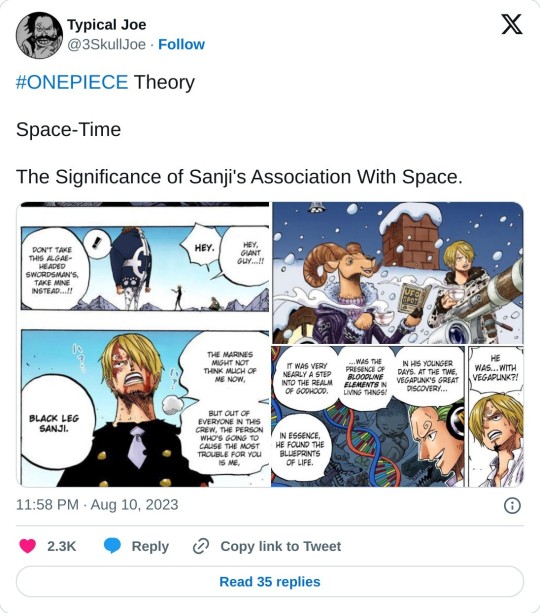
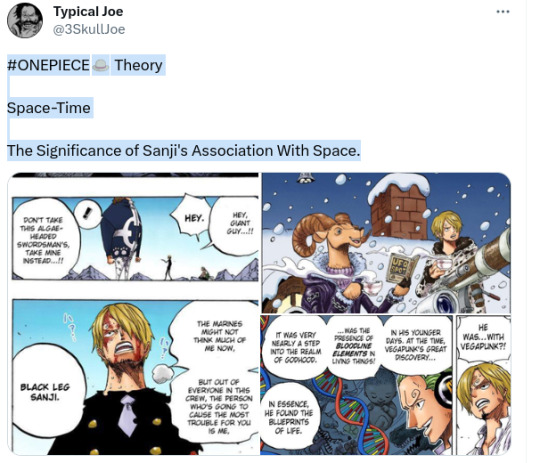
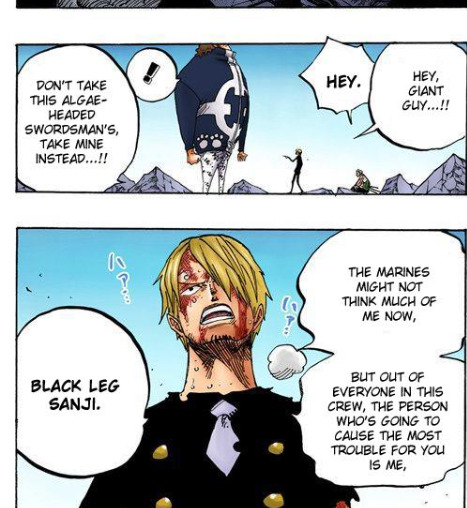
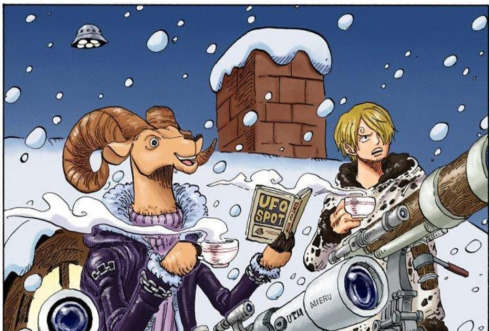
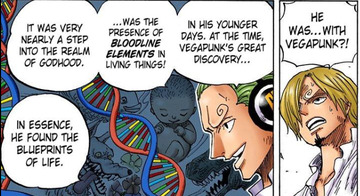
This theory will attempt to explain why Oda has repeatedly associated Sanji with the theme of space. I will explore what it means for Sanji's powers and what it means for the future of Sanji's role in the story. Let's get in to it.
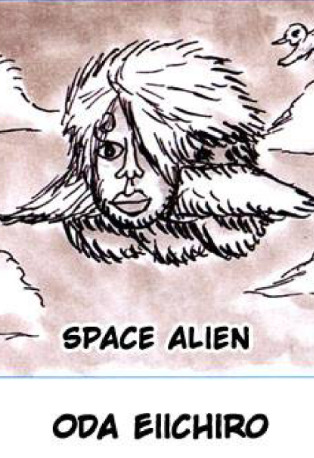
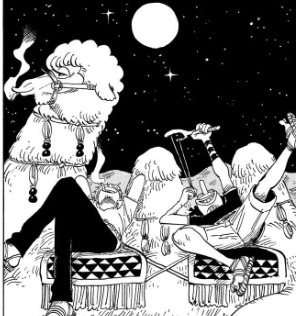
However, Sanji's connections to the subject of space started a long time ago. In ch. 841, we saw Reiju point Sanji toward a ship. We first saw this same ship in ch. 56. It's name was - "The Orbit."
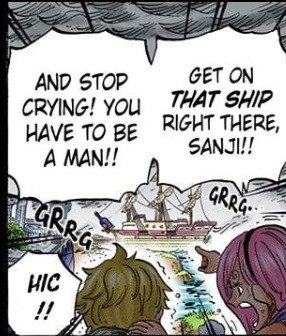
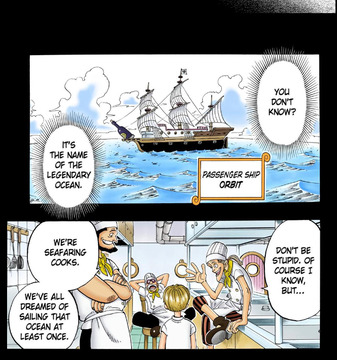
But what does it mean for Sanji to be associated with space? Does it actually mean anything significant? Ever since Sanji began to awaken his Lineage Factor modifications, we have seen his attacks begin to become associated with references to shooting stars and comets.

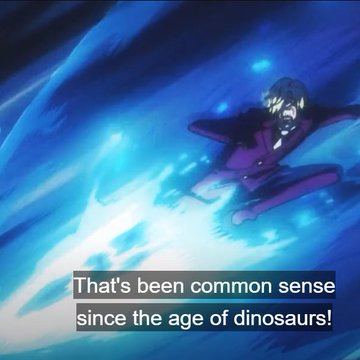
The key to understanding the full extent of the significance to Sanji's association with space can be found in this concept of the Lineage Factors. This is effectively what we call DNA. This was the great discovery of Vegapunk & MADS. 'A step into the realm of Godhood.'
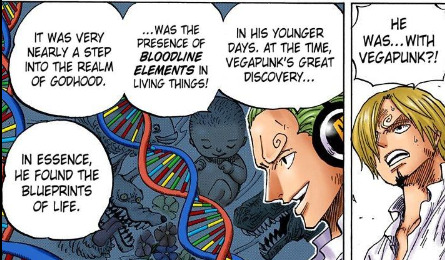
But what have Lineage Factors or DNA got to do with space or stars? If you think about it, all of the elements that form our bodies were created through the life cycles of stars. We are 'made of stardust.'

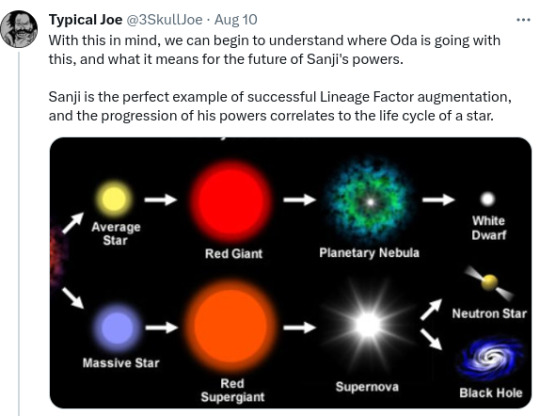
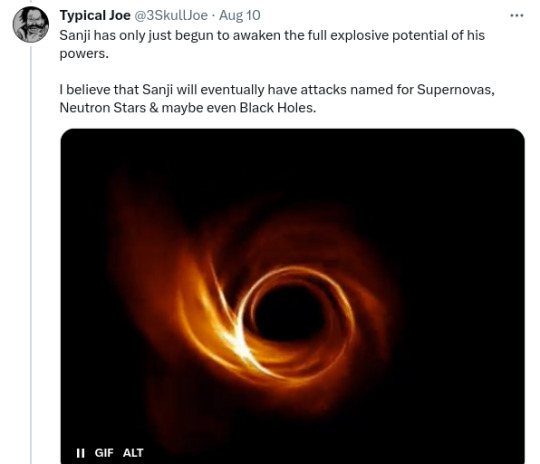
So we can see how this theme of space connections to the progression of Sanji's Lineage Factor based powers, but is there any more to it than just that? I believe that it also points us in the direction of Sanji's ultimate role in the story. The Sabotage of Saturn.
Back in Thriller Bark, Sanji vowed to Kuma that he would eventually be the one among the Straw Hats who will cause the most trouble for the World Government. Let me explain how I think that this will be Sanji causing the downfall of one of the Gorosei. Saint Jay Garcia Saturn
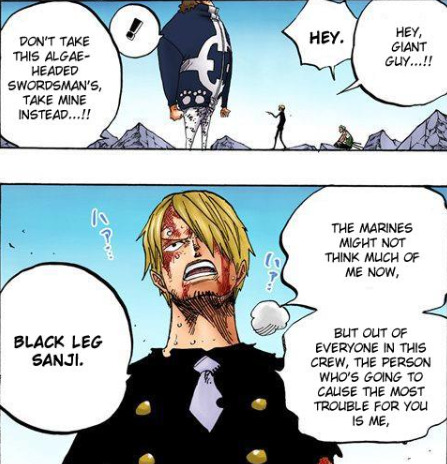
saturn is also known as 'The Defense Science Warrior God.' Doesn't it seem like a coinicidence then, that Sanji is also described as a 'Warrior of Science'? Even without all of the evidence associating Sanji with space, I think this is a clear indication that the two will fight.
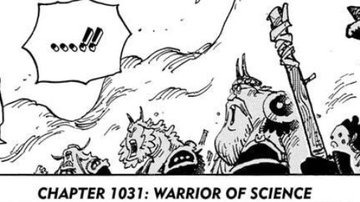
However, I don't think that Sanji will fight Saturn personally at Egghead. I believe that Sanji will sabotage Saturn's plans this time, and their fight will come later, during the final arc. Sanji's character is at it's best when he is on solo espionage & sabotage missions.
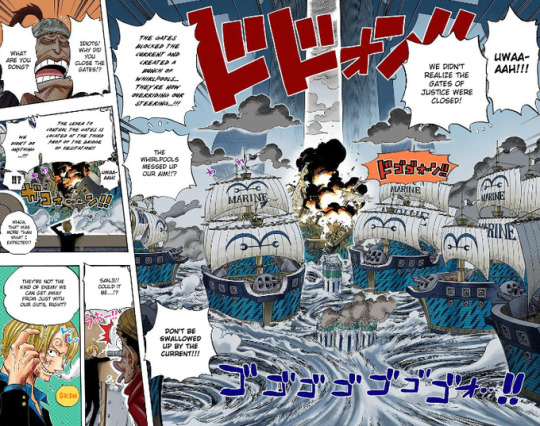
How will Sanji managed to sabotage Saturn's plans? I believe that Sanji will hijack the World Government's signals by stealing Kizaru's wiretap transponder snail. Sanji will discover the full extent of the WG's plans & this will enable him to sabotage them.
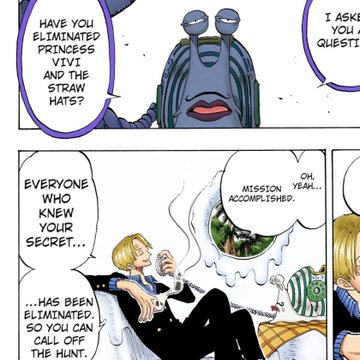
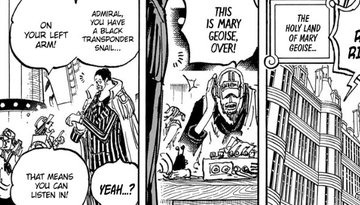
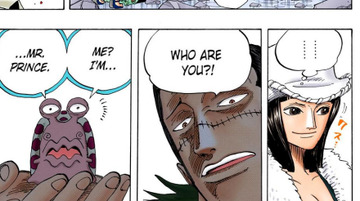
It is also worth considering that Saturn is known as the God of Time according to the Romans. I believe this is the core reason why Oda is associating Sanji with Space. To make him and Saturn two sides of a coin. Space and Time.
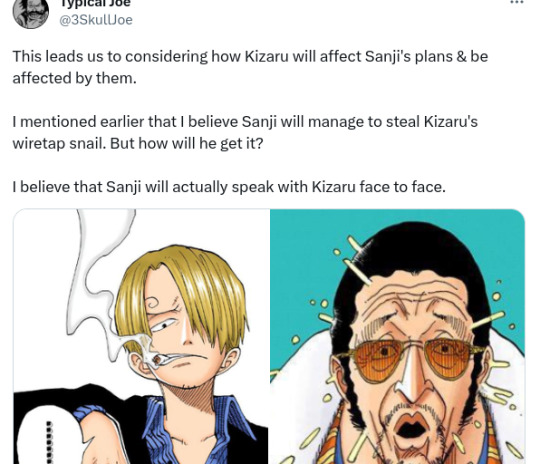
actually has quite a formal manner when he addresses people, and he will often hold polite conversation before attacking people. This makes me think that we will get a surprisingly polite conversational moment between Sanji & Kizaru before a clash.
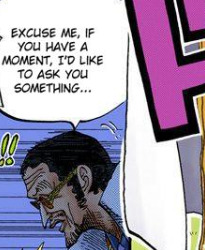
I imagine that the setting of this scene will be the two of them having a momentary smoke break. The subject of their discussion could be Lineage Factors & Kizaru's memories of Vegapunk & MADS. "The day Vegapunk and your father were arrested was the day I joined the Navy."
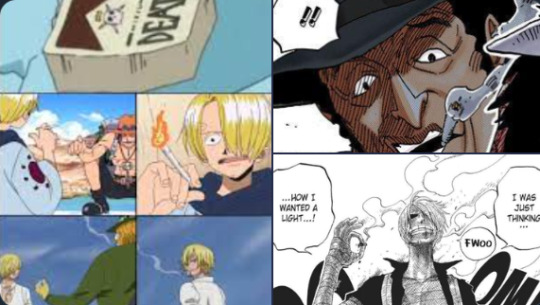
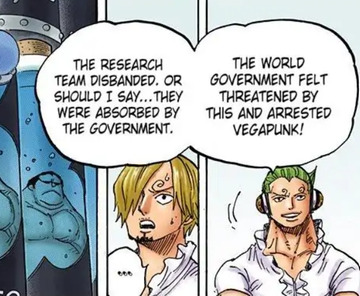
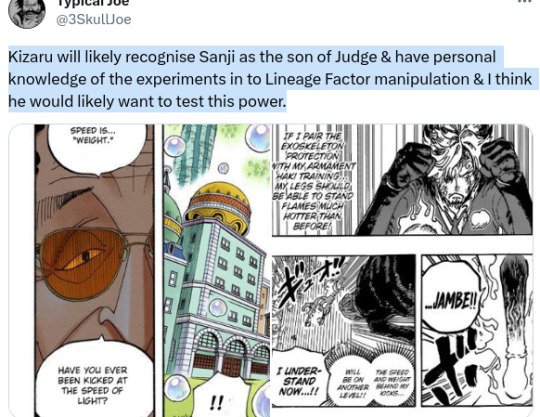
Through this encounter, Sanji may learn the true potential of Lineage Factor modification & the reason the WG feared the discovery enough to arrest Vegapunk. A fictional additional 'Alien' element to the existing elements created from stars that form the matter of life.
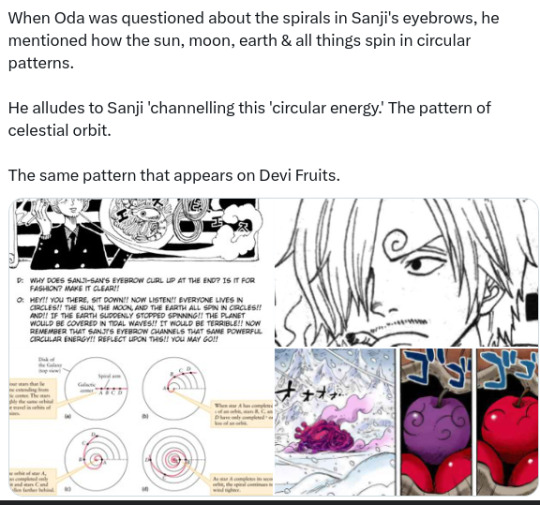
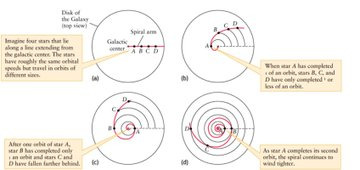
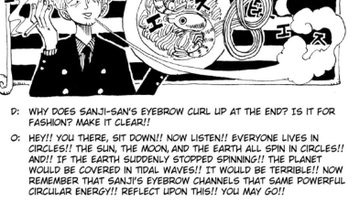
I believe that through Lineage Factor augmentation, it is possible to achieve a state of Awakening without actually having a Devil Fruit. An ancient power of alien origin considered to be - 'A step into the realm of godhood.' Apotheosis.
I believe that this is the significance of Sanji's association with space. The theme hides the true nature & full potential of his Lineage Factor based powers. And it establishes Sanji's role in countering the actions of Saturn & fighting him in the final war.
a reply I had seen
Theory sanji will mimic saint jay Garcia Saturn's to Talk to the gorosei like what happened where he talked with crocodile who thought he was me 3 ( vinsmokes can mimic peoples voices
or in your view mimic kizarus voice
#one piece#op theorys#op theories#op theory#one piece theorys#one piece theories#one piece theory#sanji black leg#black leg sanji#sanji kuroashi#kuroashi sanji#op sanji#saint jaygarcia saturn#saint jay garcia saturn#st jaygarcia saturn#st. jay garcia saturn#st. jaygarcia saturn#admiral kizaru#admiral borsalino#op borsalino#sanji blackleg#blackleg sanji#kuroashi no sanji#sanji theory
18 notes
·
View notes
Note
(Not the same anon) You just made me realize that they actually gave Drakgo that development of letting Drakken and Shego be apart/ grow away from each other and then coming back to each other at the end.
And about Kim and Ron.
Even though I am a Kim/Ron shipper I pretty much agree with almost everything you said:
There is some degree of unspoken codependency between Kim and Ron and this gets explored in a see episodes (like a sitch in time, grudge match) but it doesn’t get further than that does it?
And Kim, I’ve discussed this before, but it’s 100% true.
She doesn’t have any identity of her own, it seems her identity is “the girl who saves the world, the one who can do anything” and even Ron questioned her about this “anything, even fail”.
And this is something I’ve seen that I find it funny, but it indirectly made me aware of it.
1/14
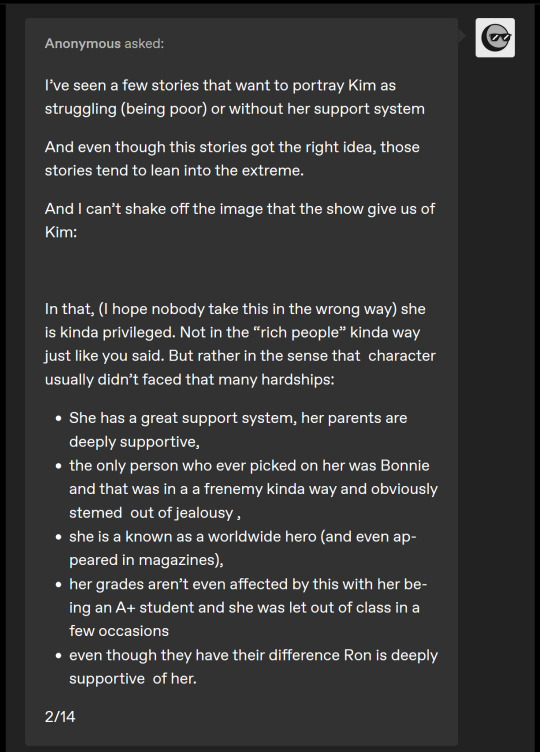
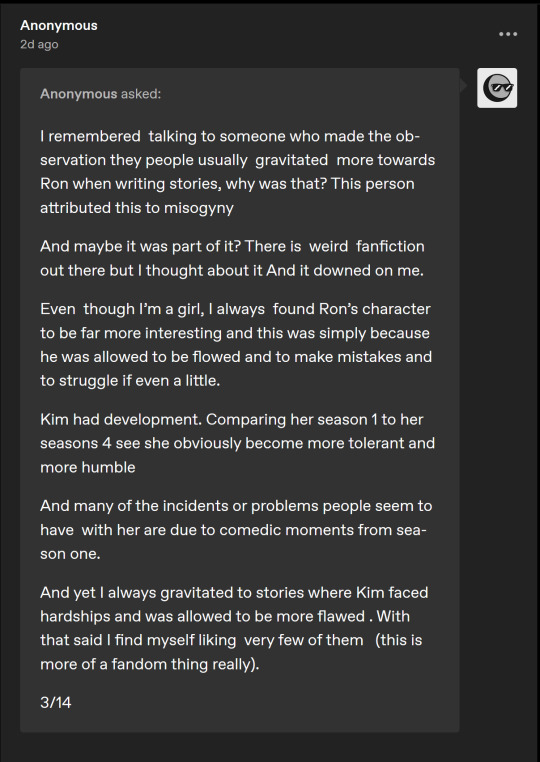
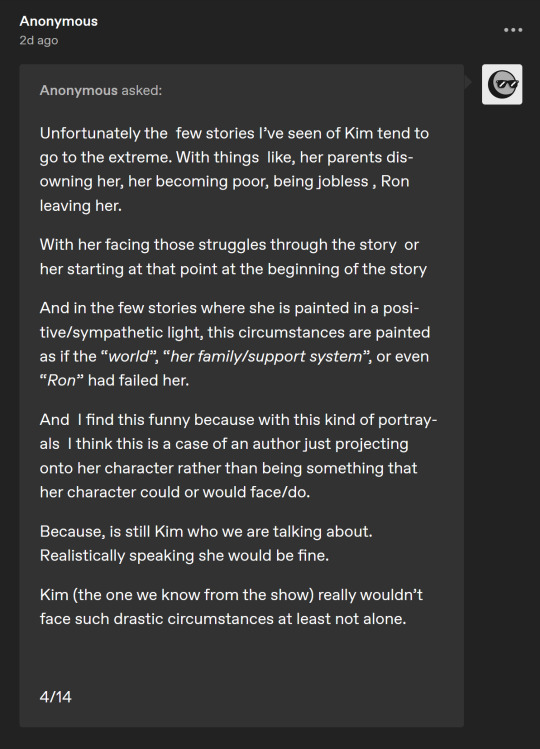
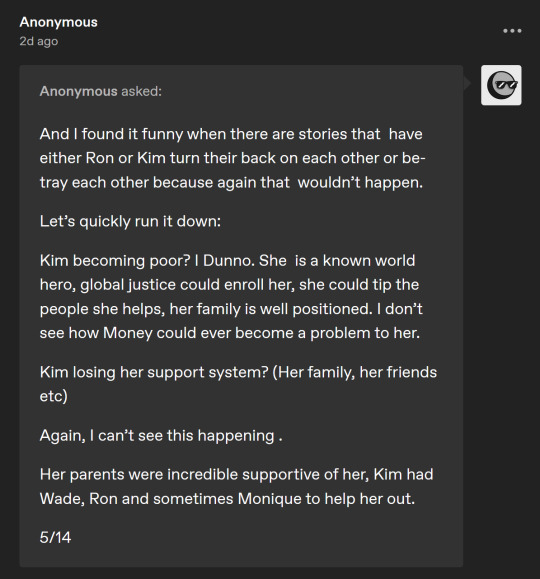
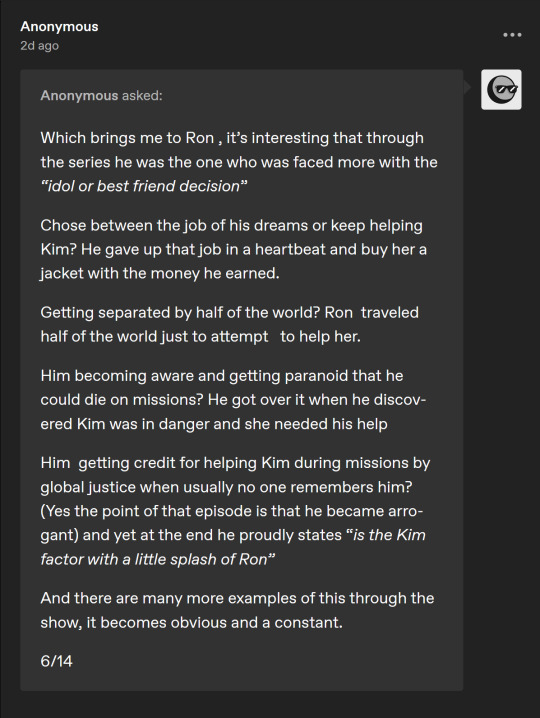
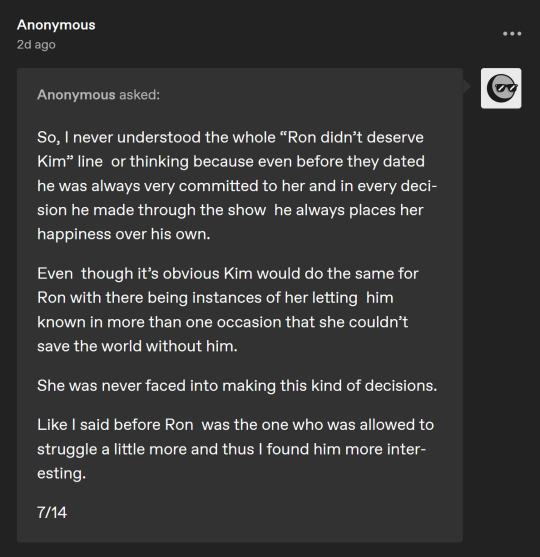
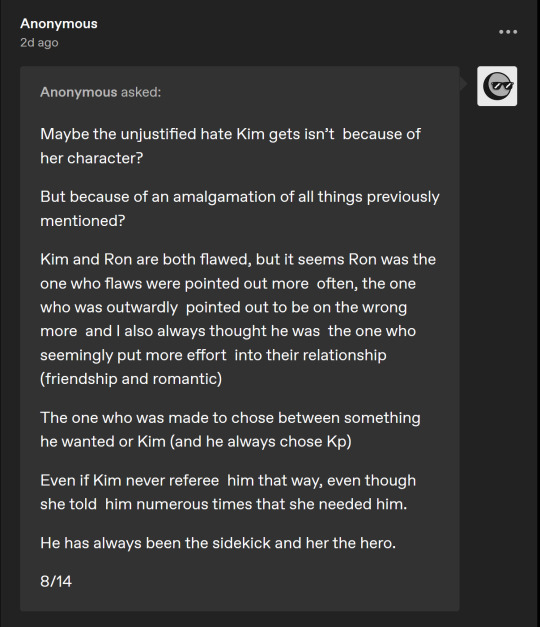
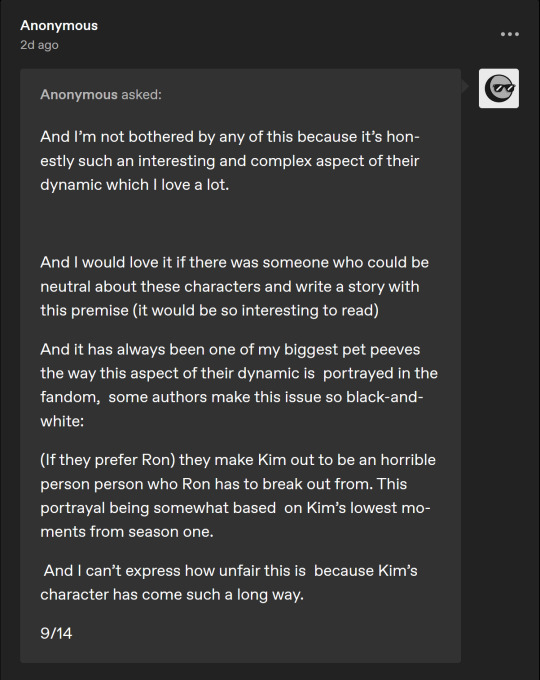
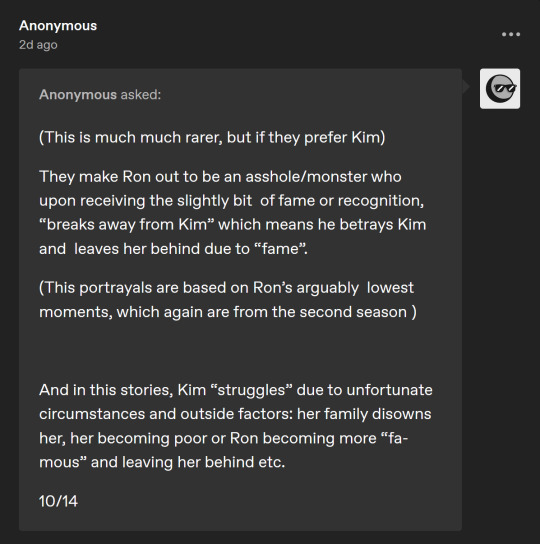
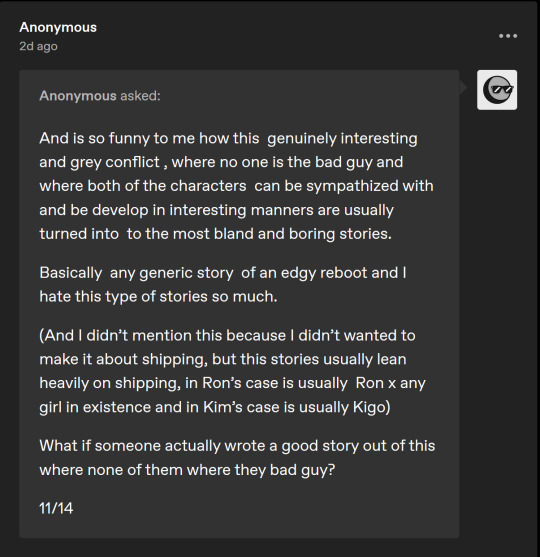
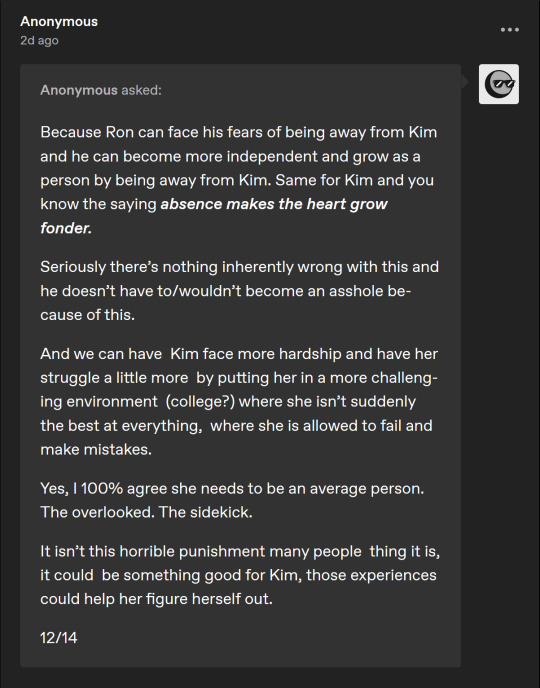
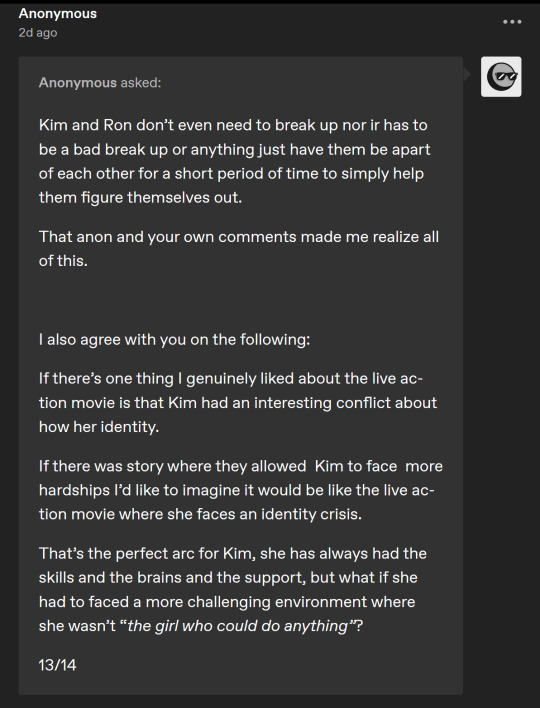
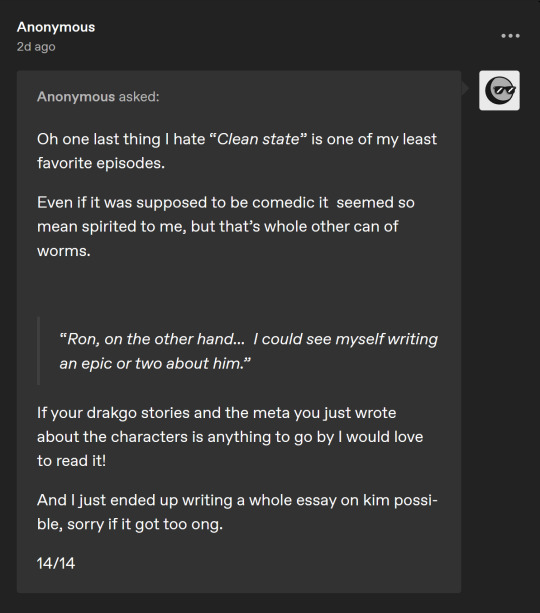
Whew! All righty, there's a lot to get into here! First of all, thanks for the ask!!!
I think in the end, the characters people love the most are those characters who are flawed. And if not the characters themselves, those who face a natural hardship. But in the end if the characters aren't deep, even that hardship won't hold our interest.
Look at a character like Bruce Wayne/Batman. We're so deeply drawn to him because he is never gonna be fixed. If the man were to resolve his issues, we would lose interest. Or, take the example of when many TV shows reach their end: they end with a marriage or birth. It's as if once characters have achieved their ideal happily ever after, there's no more story to tell. There is of course, but it's that deep relational growth that hooks us. That's why romance/intimate friendship dominates in fiction.
In the case of Drakgo, like you said, they were given a chance to be separated and then come back together. Now, the writers failed to show us that reconciliation onscreen (and to whoever sent me an ask about that in particular, I haven't forgotten! I have a very full askbox.) But Drakken and Shego are developed enough throughout the show with quirks, flaws, and other hardships already faced, that we can make some reasonable guesses about how they come back together. And write some great fanfic, too!
I personally have never been a fan of 'going to the extreme' in fanfic. It often comes across as just glorifying something unsavory. For example, a fic in which Sherlock is kidnapped and let's politely call it 'abused' in a variety of graphic ways is not selling character development for me. eMoTiOnAl DaMaGe is development, people may cry, and so on and so forth. But in the end? Those types of fics are just those in which the writer/reader wants an extremely heavy emotional connection of whatever form suits them, and they're kind of...'one size fits all'? Change the character names/settings and you can throw them in any fandom basically. Copy-paste. All that to say, any fic where Kim is suddenly out on the streets just doesn't sell 'Kim Possible' to me. Everything you explained so very well boils down to the fact that none of that is in character. Her family disowning her? Ron failing her? It would have to be an extremely skilled author to convince me of any of that, but I just can't see it happening. If it's out of character, it's out of character. That's all there is to it.
Now let's look at the format for nearly every episode: [Villain] commits [crime] and Kim and Ron must stop them while Ron deals with [comedic side-plot of the week]. That's basically the show. But in this way, Ron becomes the character we fell in love with due to his facing various trials in life. And I think because of this development, because we're allowed to see so many of Ron's private moments, his devotion to Kim means all the more and when we root for Kim/Ron, it really feels like we're rooting for Ron. Every example you gave... If there had even been half as many moments where the tables were turned... Kim going across the world for Ron, Kim giving up a job for Ron's sake... We never see that. And thus we just don't feel the depth of their relationship on her end of it. She just isn't developed, and yet, is established just well enough that she's kind of in this...limbo, where it's hard to do anything with her. It's ironically easier to do something with background characters such as Tara, who are given a personality but overall are a blank slate. There's enough to go on to do something believable and in-character. But with Kim we have too much and not enough.
One of my favorite Kim moments is actually in yet another Ron-development-heavy episode, A Very Possible Christmas (Ron and Drakken stranded together... I'd watch an hour of that!). But when Kim checks every escape pod and Ron isn't in any of them? We see her cry. And we see a brief moment of real vulnerability between her and her mom. The show does have some few and far between moments like that which give her a bit more depth. Another example is her barely-controlled anger when Bonnie kisses Ron. Those are the gems we need to look for in terms of who is Kim on a deeper level. And while overall their development is mostly in regards to their relationship with each other, Ron still gets all of the individual development while Kim gets...basically zero. She did grow between the four seasons, as you said, but not much.
I personally ignore the Kim-hate and thus can't actually say what any of it is, excepting the little you mentioned. I personally do not see anything to hate? I can't hook onto her season one behavior as anything to dislike because I can't separate myself from knowing that the writers were still figuring out the characters. It's much more interesting to think about Kim’s behavior as a fourteen year old's pubescent emotions toward her bestie/crush than so-called mistreatment of him. And any of Ron's low moments I feel can't be used as justification since he always learns from them by the end of the episode and genuinely grows. All these stories you mention... They're the sort of thing I never click, because they're just so blatantly out of character. Not saying people can't write what they want, but it holds zero interest for me. I scroll past. And all those Ron-with-girl or Ron-harem fics... Let’s face it. Those are just to see the nerdy guy get the hot girl. Plain and simple. Probably writers projecting in many cases. People can write whatever they want, but yeah... Just another...one size fits all, copy-paste sort of fic sitch.
The irony in thinking about all those fics is, the greatest 'punishment' for Kim or Ron simply would be being apart from one another. They've never had to do that. Ron says it in So the Drama: he spent one summer away from her. Since Pre-K, they've always been together. He goes on family vacations with her, eats dinner at her house, spends Christmas there even though it's not his holiday. They ARE inseparable and that's why Sitch in Time's plan was so brilliant, AND So the Drama. Only thing in the latter Drakken could have done better was also create a syntho-hottie to distract Ron. But no one ever considers the Ron factor~
Kim and Ron can be separated in college and have a long-distance relationship without horrible things happening, as you say. They can just be normal and in that find character development. Whether they break up or not, the best thing for them would be time apart. They'll have the greatest chance at long-term success together if they have that opportunity to grow individually. It's not saying they're doomed to fail if they don't have time apart. Just that it would be good for them. And even if they did break up for awhile, I can never see them not being best friends.
Thinking about it more, Kim does get some minor issues in the show. Not wanting to be mentored by a janitor. Being too busy to honor all her commitments. Having to get past embarrassment. But somehow the show never treats them with the same depth as Ron's things. But it feels like she never actually learns from them, since beating up the bad guys comes first. And as you say, it always comes back to her being the girl who can do anything. I do truly wish she'd had more depth in the show, but overall that wasn't the point. It was about a girl version of James Bond/Indiana Jones.
Now, can an action adventure series with protagonists who just beat up the bad guys endure? Oh yes. "In 1972 a crack commando unit was sent to prison by a military court by a crime they didn't commit..." But there again, in the case of The A-Team those characters had some very distinct development. Where our female version of those beloved guys, Kim, just doesn't. A college story that really digs into who she is besides the girl who can do anything would appeal greatly. Just like you said, putting her in an environment where she's just one of the crowd. A story like that would be challenging to write, but it feels like the sort of thing that should go right alongside a story of Ron being on his own. I think that's where I would take it, personally. And to satisfy my own interests, Kim's growing up would probably start with Ron breaking up with her to be with Yori. Not maliciously of course, just a natural course of events. And then Kim would find one thing in her life that she cannot solve, and that's the first step into growing up. The ideas were already burning in my head, Anon, but you're stirring them up!
I cannot let go of Clean Slate because of Drakgo. Was Kim weird in that ep? Oh yes. But I watch everything through a Drakgo lens soooooooooooooo... It's a pretty good ep for Drakgo character development. Aren't they all, though? ;D Speaking of...since you are so thoughtful a person, have you any thoughts on my fave two characters?
#kim possible#ron stoppable#meta#ask answer#drakgo#drakken#shego#yori#kimxron#kim x ron#kimron#kim/ron#kim and ron
17 notes
·
View notes
Note
https://at.tumblr.com/laconic-lolita/if-you-worship-apollo-youre-technically-a-rape/hx8lf2t0xq1q
I...i have no words honestly. Imagine being so completely out of touch and thinking you're right 🤣🤣
The blog formatting on desktop was insufferable for my eyes, so I'll leave a screenshot here.
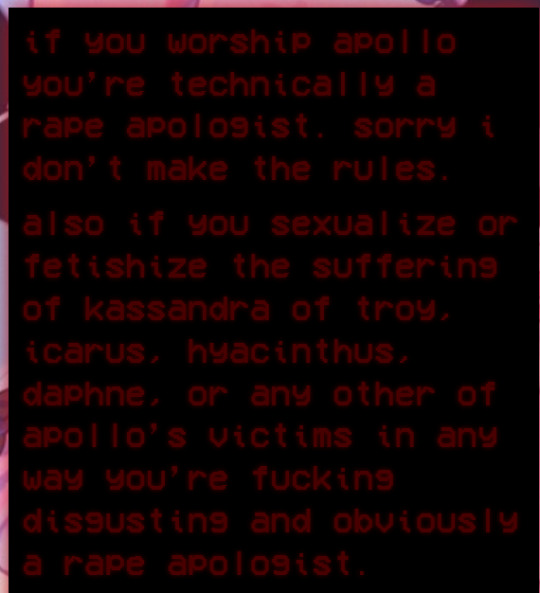
Here there are multiple weird stuff and some truth at the same time. Please, bear with me as I try to explain my thoughts.
Yes, the Greek gods, including Apollo, were entitled to the mortals, and they saw them as sexually available to them. This resulted in rapes of men and women (and even other deities/divinities), according to the folklore/religious stories of our ancients. Let's say there was a reason ancient Greeks largely became more favorable to the Christian god (Christianity wasn't forced in Greece, it was largely accepted) in comparison to the old gods.
The gods many times acted in a certain way, and just because it's 2022, it doesn't mean that Apollo has gone into therapy and now his every action reflects modern morality and christian standards. The hundreds of texts we have about the gods show us their nature and character. It is what it is.
That being said, it's a very large and unfair leap to say that Apollo worshipers are r*pe apologists. I don't know if most Apollo worshipers have reconciled with the fact that Apollo and other gods attempted to r*pe and/or r*ped people, honestly. But I don't see them supporting r*pe.
Now, for the rest of things, I understand that people sometimes write fics as a creative outlet, or to make alternative universes, and it's not the end of the world. I may not read these fics and I might not like them, and I might even express an opinion against them. But for the larger part, if we are talking about fics, I wouldn't call the creators I disagree with "fucking disgusting" (I don't do that to painters, and I don't do that to writers). If it becomes a commercialized trend (or if it feeds it), if large masses start believing things untrue to the ancient Greek culture just because of a very famous writer, then there is a problem.
For example, I don't think that the abduction of Persephone should be sugarcoated or avoided in the text. But if one fic asks "hey, what if they fell in love before Persephone got abducted?" then that doesn't rile me up. I might not like the story, but again, not the end of the world. I criticize LO (not so much on my blog now) but making Hades and Persephone fall in love and leaving out the violent abduction weren't the biggest red flags for me.
When we read something imaginary, we acknowledge that it's fiction. Goodness knows I have many comments for many types of media, but even I understand that small fandom creators who explore alternative stories are most often not apologists of violence.
17 notes
·
View notes
Text
Professional assumptions set standards of competence but can generate silos:Part 2
Our misplaced confidence has been based on the laws of physics to assume and explain many physical phenomena. They held up well in the past, so it seems reasonable to assume that they will continue to hold out in the future. But no matter how many times we see that one thing causes another logically, we cannot be certain that this will always be the case. Formally put those the laws are not logically implied by the observed instances, however numerous they may be.
Read more: Natural law is a good place to start
Philosophers call this the problem of induction-to deduce the general case of a a private individual. Bryan Magee summed it up well when he wrote "Even when everything past futures have looked like past pasts it does not follow that all future futures will look like future pasts ' .
These types of the hypotheses formulated by professionals are more formal than those of everyday life. The the reason is that professionals must be able to justify their decisions to us, the public, and through us to the law of the land. They are responsible for what they do. They have what lawyers call a public "duty of care". This means that they have obligations act towards others by adhering to a standard of due diligence in accordance with the standards claimed by their profession. To fulfill these obligations, all ideas should be shared and discussed at length. This is a kind of formalization of a social contract between a professional and the people likely to be affected by his decisions. So it is important to try to understand why assumptions, whether individual or collective, this could hinder progress towards our goals.
Another way of looking at it is that professional assumptions must be verifiable.
The philosopher Sir Karl Popper distinguished scientific knowledge from others by demanding that it be testable. By this he meant testable by physical experiment or if it is not feasible, then testable by a critical discussion. We will explore this important distinction in more detail later, because it is important for deciding between news and fake news, between fact and fiction, between the things we can depends on and things we can't.
A way of thinking about our assumptions, thoughts and beliefs, whether personal or professional, it is that they become a cognitive "pair of glasses" through which we see the world and everything in it. We interpret our world and our part through these lenses. They become a filter through which we interpret the evidence that corresponds to what we believe to be the case, that is, true. In professionals this can and does,9 as we said earlier, lead to separation silos and fragmented thinking that are deep and highly specialized, but that do not not at all in relation to each other.
This can result in organizations where the resources are not shared between departments. It can do integrated work "joint’
together in more difficult teams. Ideas are not exchanged, production slows down on the decline, inefficiencies increase. Employees and customers feel frustrated growth prevented business.
As stated earlier, Buddha said: "We are what we think... with our thoughts, we make the world". If the Buddha were alive today, I am sure he would add-the the way we think and behave must change. If life on Earth is to survive massive damage or even possible extinction, we must think and do things differently.
In companies and in everyday life, we need to collaborate better. The means of do this are well known but often ignored. Transparency of news, information and best practices are one of the first requirements. Others include learning together develop our knowledge and skills, build trust through the clarity of democracy values and obligations to each other and to our environment, communicate shared experiences and determined objectives, and development of strategies to achieve them. In short involve everyone who has an interest in the way we live. We'll see later
these are all aspects of what Jon Alexander11 and others call "citizen history".
They want us to move from the "history of the consumer" to the history of the citizen-where we all consider ourselves citizens of the world as well as our own communities and nations. The first step in this journey is to become critical of our own assumptions. To keep our minds open to alternative points of view.
History tells us that in times of war, a common enemy creates a shared enemy common goal. We have this war, and the enemy is our changing climate. To fight this war, we will have to come together and that will almost certainly mean changing some of our individual and collective assumptions.
0 notes
Text
Literature has long been celebrated as a means of escaping reality and exploring the depths of the imagination. Through storytelling, readers are transported into different worlds and introduced to fantastical creatures, such as insects and werewolves. While these creatures may seem harmless in the realm of fiction, they have been unjustly labeled as guilty and sinister in the real world. In reality, literature is guitless for portraying insects and werewolves in a negative light.
First and foremost, literature serves as a reflection of societal fears and anxieties. Insects have long been associated with fear and disgust, with many people having a natural aversion to them. This fear is often depicted in literature, where insects are portrayed as creepy, crawly, and menacing creatures. This portrayal has been perpetuated through popular horror novels and movies, such as “The Fly” and “The Silence of the Lambs,” where insects are used to evoke fear and play on people’s phobias. However, this does not mean that literature is responsible for creating fear and hatred towards insects. In fact, this fear is deeply ingrained in our psyche and has existed long before literature even existed.
Similarly, werewolves have also been unjustly portrayed as evil and bloodthirsty creatures in literature. Dating back to ancient folklore, werewolves were often depicted as cursed individuals who transformed into monstrous beasts under the full moon. In modern literature, werewolves have been popularized as violent and uncontrollable creatures, preying on innocent humans. However, the origin of werewolf folklore can be traced back to the fear of the unknown and a way to explain unexplained events in the natural world. Literature may have perpetuated this portrayal, but it is not solely responsible for creating the negative image of werewolves.
Furthermore, literature has also been instrumental in challenging and redefining these negative stereotypes of insects and werewolves. Many authors have used these creatures as symbols for societal issues and have given them more complex and nuanced personalities. For example, in “Metamorphosis” by Franz Kafka, the protagonist transforms into a giant insect, but the story is not just about a terrifying creature. It delves into themes of human isolation and the struggle to conform to societal expectations. Similarly, contemporary literature has seen a rise in werewolf characters that are not just villains, but complex and sympathetic protagonists.
In addition, literature has also played a crucial role in shedding light on the importance of these creatures in the ecosystem. Insects, for example, play a vital role in pollination and are essential to maintaining the balance of the natural world. Similarly, werewolves, despite their fictional nature, can serve as a reminder of humanity’s connection to the animal kingdom and the need for coexistence.
In conclusion, literature cannot be blamed for the negative portrayal of insects and werewolves in society. It is simply a reflection of our fears and anxieties, and can also be a powerful tool in challenging these stereotypes and promoting understanding and empathy towards these creatures. It is important to remember that literature is not responsible for creating fear or hatred towards any living being, and instead, it can be a platform for promoting acceptance and appreciation for all creatures, even the fictional ones.
0 notes
Text
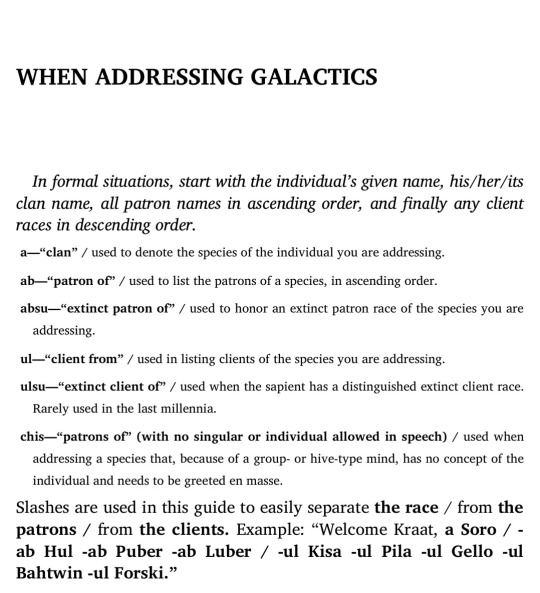
Oh, hey! Excellent :D I have been looking for this.
I definitely want Space N’s Federation (and universe as a whole) to be Uplifty. Both because I like Uplift and in order to “explain” changes. Such as getting parts of how I imagined Aandrisks wrong compared to how they are actually described and defined, so I can simply make Aalphrisks Ab Aandrisks, the correct version exists and my mistake is simply a client species Uplifted in part for similarities. And thirdly, I think it sets up a tension I would like to explore.
I want Space N to thematically reflect social progress. I feel that is definitional to what I am imitating. That doesn’t mean perfect. Or just glaring error. I want the idea to be that we get better up to the fictional point of now AND that we can still get better from there.
The ideas of Uplift both support and clash with that.
How do you make decisions for others (100% necessary for artificial Uplift) when I would hold personal autonomy as a core principle of social progress? How do you force change (again, 100% necessary) and deal with bodily autonomy, human rights, freedom? Where do rights change varying by population size? How do you reconcile and differentiate care vs colonialism? Plus tons of other issues that I am not thinking of within 30 seconds.
How do you do Uplift the way the Federation would do it? And I don’t really know. How could they be even better? Again, dunno. I think that makes it interesting for storytelling. Find out.
I think I would like some deeper terminology though.
Ab is what I was looking for at the top level. For Aalphrisk Ab Aandrisk. But I am thinking of at least two characters of Uplift origin to bake that tension in.
Subcommander Jolly, the Aalphrisk Ab Aandrisk, who is chief Helm Officer (Sulu’s equivalent), whose species I am figuring is in the easy final position, essentially everything is done except taking off the name, if they want to. They’re full Federation citizens like any other.
The person I haven’t really started yet is the chief engineer. Their species is relatively early in the Uplift process, so problems should show up. I definitely want to keep some of the ideas from one of the main inspirations for the species which is Pilot from Farscape. That Uplift is inevitably not always nice and pleasant and inevitably smacks of colonial abuse. Sebaceans are uplifting them and Sebaceans are staunchly Federation (the hero group) and it’s all still there.
And I would like a way to indicate that Pilot’s species holds a lower social tier, legally, so that is obviously in play. While I also figure out how not to follow NuTrek’s way of dealing with this kind of issue because I don’t think it’s working for me. Yes, I want problems. No, I don’t want “us” still struggling with the exact same social problems in the exact same way as we are doing now in real life.
I’m told Orville has dealt with my feelings a bit, that it argues its social progress underlies its technological progress. You can’t have a replicator based society unless you have already figured out solutions to wealth inequality. Because if someone invented a replicator in our current world with our current problems, only a tiny handful of people would ever be allowed to have one in order to keep that wealth inequality stable. And the tech would end up stagnating because of such low “demand” and all the obstacles put in place.
Whereas NuTrek has Picard in a mansion and Rafaella in a trailer. In the middle of nowhere. Which is what we have.
In classic Trek, that’s an Alien problem. The ship rolls in and promises that the Federation solved that problem and they can, too. The Federation has other problems. The problems that come from solving those problems. Which are often the same problems in another guise but whatever.
I suppose I will just have to make it up.
0 notes
Text
"Preserving the Flow: A Water Conservation Crusade"
Definitions:
Story: A narrative of real or invented events, typically told in chronological order. A story can be written or spoken, and can be presented in a variety of forms, including novels, short stories, poems, plays, and films.
Tale: A short, simple story, especially one that is traditional or imaginary. Tales are often told to children, and often feature magical or supernatural elements.
Science fiction: A genre of fiction that deals with imaginative and futuristic concepts such as advanced science and technology, space exploration, time travel, parallel universes, and extraterrestrial life. Science fiction can explore the potential consequences of scientific and technological advances on society and individuals, and can also be used to address philosophical and ethical questions.
Story:
As I stepped into the sleek time machine, I could feel the rush of anticipation and uncertainty. My mission was clear: to travel to a future where humanity had exhausted its water resources and return with the information that would have prevented such a catastrophic event. With a deep breath, I started the process, and the machine whirred to life, rushing me forward through time.
Meanwhile, the year was 2150, a desolate future where the consequences of water scarcity were painfully evident. I found myself among a world struggling with parched lands, dry crops, and desperate communities. It was a harsh reminder of the urgent need to act. Subsequently, I met Xiomara, a brilliant scientist who was committed to solving the problem. She explained the devastation caused by excessive and pollution of water, leading to a severe imbalance in the ecosystem.
Simultaneously, Xiomara and I explored her innovative research, revealing advanced technologies that could rejuvenate and sustain water sources. With meticulous attention, I absorbed the intricate details of their futuristic water purification and conservation methods. She introduced me to Steve, the engineer behind the invention, and we worked together to update the designs for the current era.
When I returned to my present, I was filled with fierce determination and equipped with the knowledge that could save humanity from impending catastrophe. I got together with my best friends, Ben, Terry, Kai, and Daniel, a group of marvelous intelligent people, to start sharing futuristic water solutions. The transition was not easy; skepticism and doubt echoed through the room.
However, as we combined our resources and knowledge, the vision became a reality. Through collaboration, we adapted the advanced technology to our present infrastructure and put thorough water saving plans into place As a result of our actions, the planet began to heal by replacing the parched aquifers and nourishing arid lands.
With patience and persistence, we spread awareness, inspiring a global movement towards responsible water use. Bit by bit, we saw the transformation as the water crisis was prevented. Once again, our world prospered demonstrating a testament to humanity's resilience and innovation.
As the years passed, our actions became an action of hope for future generations. In the end, the experience of time travel and the collaboration that followed taught us that even in the face of an obscure future, unity and determination can turn the tide and ensure a brighter tomorrow.
References:
Story definition and meaning | Collins english dictionary. (n.d.). https://www.collinsdictionary.com/dictionary/english/story
Tale definition and meaning - Cambridge Dictionary. (n.d.). https://dictionary.cambridge.orgdictionary/english/tale
Wikimedia Foundation. (2023, October 15). Science fiction. Wikipedia. https://en.wikipedia.org/wiki/Science_fiction

I generated this image with Canva IA
Video:
0 notes
Text
Preserving the Flow: A Water Conservation Crusade
Definitions:
Story: A story is a connected series of events told through words, or any other form of communication. You can tell a story about anything, and the events described can be real or imaginary; covering both fiction and nonfiction (Admin, 2018).
Tale: A narrative that relates the details of some real or imaginary event, incident, or case (“Tale Definition & Meaning | Dictionary.com,” 2021).
Science Fiction: Science fiction is a genre of speculative fiction that contains imagined elements that don’t exist in the real world. Science fiction spans a wide range of themes that often explore time travel, space travel, are set in the future, and deal with the consequences of technological and scientific advances (MasterClass, 2021).
Story:
As I stepped into the shimmering portal, the familiar disorienting sensation of time travel washed over me. My mission was clear. I need to knock off the water crisis that threatens our future. I found myself in the year 2052, a world wrestling with the consequences of water waste.
I met Kira, a brilliant scientist, she explained to me that in the future, the planet's water sources will be reduced to dangerous levels. Then, I realized the enormity of our task. "We need visionary solutions, and we need them now". Kira said.
Firstly, we embarked on our journey, our first stop was a massive metropolis with towering skyscrapers. Water flowed everywhere, but it was treated like a limitless resource. "Water recycling," Kira exclaimed, "is a must." We introduced advanced technologies that purified and reused water, and the residents began to see the benefits. As a result, the new strategies speed up a positive change to prevent water scarcity.
Our next destination was an agricultural region, devastated by drought. However, with Kira's guidance, we set up irrigation systems and genetically modified crops that required less water. Farmers embraced these changes, realizing that their livelihoods relied on sustainable practices.
In a remote desert community, we met up with a family battling to survive. They had no access to clean water. “We must install atmospheric water generators”, I proposed. By extracting moisture from the air, we provided them with a sustainable source of clean water.
Our journey took us to a corporate main office, where a profit-driven mindset had kept up water waste. We both engaged in a heated debate with the CEO since he wasn’t open to our proposal. "We need your support for a new era of corporate responsibility," I spoke up. With the promise of long-term profit from sustainable practices, the CEO ended up agreeing to change the company's approach.
We moved forward in time, witnessing the positive effects of our interventions. People have started to embrace water-saving habits and appreciate the value of this precious resource. Kira and I were met with gratitude and admiration from the people whose lives we had saved.
As we prepared to return to our own time, I looked at Kira, my partner in this journey. She smiled and said, "We've given them the knowledge and tools to prevent the water crisis. Now, it's up to them to make the right choices."
With a final glance at the future we had helped shape, we stepped back into the time portal, filled with hope and determination. The transition from that future to our present was abrupt, whereas the lessons we had learned were imprinted in our hearts.
The experience had left me with a sense of responsibility. While standing in the present, I knew that it was up to us to ensure that the future Kira and I had witnessed would never become a reality. In short, water waste and scarcity could be prevented with the right actions, and I was ready to be a part of the solution.
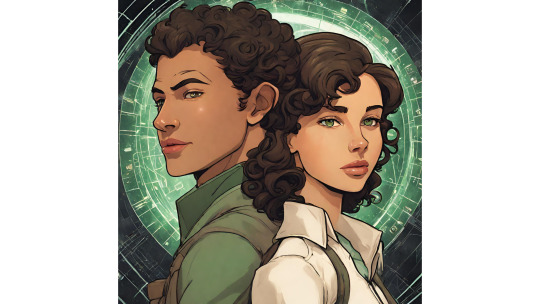
References:
Admin. (2018, November 3). Story: Definition and Examples | Literary Terms. Literary Terms. https://literaryterms.net/story/
MasterClass. (2021, September 1). What is science fiction Writing? Definition and Characteristics of Science Fiction Literature - 2023 - MasterClass. https://www.masterclass.com/articles/what-is-science-fiction-writing-definition-and-characteristics-of-science-fiction-literature
Tale Definition & Meaning | Dictionary.com. (2021). In Dictionary.com. https://www.dictionary.com/browse/tale
0 notes
Text
About This Blog
This blog was created for me to explore the different aspects of love and how I feel about them. This includes all forms of love, but will focus on aspects of romantic and sexual love. This blog will often shift in tones, as I have DID (dissociative identity disorder) and this is a blog that our entire collective will use to express themselves. We will not make that the focus however, it was mainly to explain why it may go from “love is a vile and painful thing” to “I think love is amazing and sweet and pure” with very little pattern or meaning to said shifts.
This idea of love will not only extend to people, but also the natural world. It will explore favorite fictional characters and their arcs of love, it will kind of be a dumping grounds for us to put things regarding the concept of love that we enjoy but don’t fit in other side blogs. There will also be highly NSFW themes at times, and I may reblog sexual scenarios I find appealing or fanfictions relating to themes I/we enjoy.
About Me
Name: Just call me Reverie or Rev
Pronouns: He/Him or They/Them
Age: mid-20s adult
Gender/Sexuality: I am a trans man, though my gender is not binary male and hard to pin down, though genderfluid is probably the best way to describe it. I am pansexual and a switch. No, I have never made a decision in my life. I have a strong preference for T4T romance.
Other info: I have DID (previously stated), am autistic. I also write and make art quite often, though I probably won’t share much art here. I may write little drabbles if I feel up to it but we’ll see.
Tags I’ll (try to) use for categorization:
#revs thoughts — my personal thoughts and original posts
#revs writing — my personal writings and original posts
#rev being feral — any posts of sexual nature (block if you do not want to see these, they will be both original posts and reblogs) Any and all fetishes or things that may require censorship will also be tagged
#rev getting emotional — posts relating to emotional feelings, both romantic or platonic in nature, both original and reblogs
#rev getting sappy — posts with a romantic lean, both original and reblogs
#artsy rev — any art I enjoy, usually reblogs
#revs hyperfixations — anything I’m hyperfixated on that fits the theme of this blog. Usually fictional characters tbh.
Will add more if I see fit. Will also use tags outside of this but those are mainly post specific.
Trigger Warnings:
I will try my best to always tag things that would need a TW. But please know there will be sexual themes, sometimes subversive in nature. The eroticism of cannibalism and violence of love comes to mind. I have experienced a lot of SA in my life as well and so themes related to trauma as a whole and how it affects my experience with love and sex may appear as well.
DNI:
Nothing comes to mind, though there is NSFW here and if I see minors or ageless blogs interacting with those posts they will be blocked immediately. Anyone can follow and if I feel uncomfortable by your interactions or things I see on your blog I’ll just block. Block button is free and I am a cheapskate.
Otherwise, enjoy your stay🥰
0 notes
Note
You mentioned something about fantasy politics and Dragon Age, could you explain what you mean by that? I'm not familiar with Dragon age, Mass effect, of their fandoms?
Basically, when you have a fictional universe that has any level of complexity, you're also going to have fictional politics. Depending on the nature of the conflicts and issues present in this world, there will also be an active discussion surrounding them in the fandom
These discussions can quickly become very heated. Often because of lack of sensitivity from the writers when it comes to where they drew inspiration from, from fans projecting to heavily onto one group, or from lack of nuance and the urge to view everything as a direct mirror for our world. Most commonly it's a mix of all three
Using bioware games, which have an especially fired up fandom about this, as an example: People get very angry at humans being "space racist" in Mass Effect, while overlooking the nuances of the political climate in-universe where humans are very much not the in power group at all. People overidentifying with mages in Dragon Age as an allegory for queer people, and getting personally offended when the story even tries exploring nuance there. Elves also in Dragon Age drawing a little too much inspiration from real-life hardships, which makes for a very unfortunate situation all around, and again can cause a very strong emotional response to story developments and plot twists as the line between real and fiction becomes blurred
World of Warcraft falls into the same icky area as a lot of fantasy at the time of its creation(and even now) in that it borrows from non-white cultures for its monster races. On top of that, so much of its premise comes from retroactively adding nuance to an 80's "evil invading orcs" game. That's not even to mention how, because of its mmorpg nature, so many story decisions are based around gameplay(keeping pvp relevant, giving players for both factions a reason to feel like heroes) rather than having a well thought-out narrative
I don't need to interact with the fandom to know it's a tirefire, and while there are certainly plenty of things worth debating, I'm never gonna have a good time doing that in a reactive fandom environment(I'm more likely to discuss it among friens), and ultimately I'm just here to enjoy a video game and prefer to engage with the story as it is, and focus on the elements of it that bring me joy
#like after dealing with 'mage rights!!!' during my teens#i do not need horde vs alliance discourse#I like em both I think both have sloppy writing at times#i dont have the energy to get Mad Online or listening to other people being Mad Online about it#ask wave
0 notes
Note
Hi. I’m curious. What did you mean by “women who read fiction might get Bad Ideas!!!” has just reached its latest and stupidest form via tumblr purity culture.? I haven’t seen any of this but I’m new to tumblr.
Oh man. You really want to get me into trouble on, like, my first day back, don’t you?
Pretty much all of this has been explained elsewhere by people much smarter than me, so this isn’t necessarily going to say anything new, but I’ll do my best to synthesize and summarize it. As ever, it comes with the caveat that it is my personal interpretation, and is not intended as the be-all, end-all. You’ll definitely run across it if you spend any time on Tumblr (or social media in general, including Twitter, and any other fandom-related spaces). This will get long.
In short: in the nineteenth century, when Gothic/romantic literature became popular and women were increasingly able to read these kinds of novels for fun, there was an attendant moral panic over whether they, with their weak female brains, would be able to distinguish fiction from reality, and that they might start making immoral or inappropriate choices in their real life as a result. Obviously, there was a huge sexist and misogynistic component to this, and it would be nice to write it off entirely as just hysterical Victorian pearl-clutching, but that feeds into the “lol people in the past were all much stupider than we are today” kind of historical fallacy that I often and vigorously shut down. (Honestly, I’m not sure how anyone can ever write the “omg medieval people believed such weird things about medicine!” nonsense again after what we’ve gone through with COVID, but that is a whole other rant.) The thinking ran that women shouldn’t read novels for fear of corrupting their impressionable brains, or if they had to read novels at all, they should only be the Right Ones: i.e., those that came with a side of heavy-handed and explicit moralizing so that they wouldn’t be tempted to transgress. Of course, books trying to hammer their readers over the head with their Moral Point aren’t often much fun to read, and that’s not the point of fiction anyway. Or at least, it shouldn’t be.
Fast-forward to today, and the entire generation of young, otherwise well-meaning people who have come to believe that being a moral person involves only consuming the “right” kind of fictional content, and being outrageously mean to strangers on the internet who do not agree with that choice. There are a lot of factors contributing to this. First, the advent of social media and being subject to the judgment of people across the world at all times has made it imperative that you demonstrate the “right” opinions to fit in with your peer-group, and on fandom websites, that often falls into a twisted, hyper-critical, so-called “progressivism” that diligently knows all the social justice buzzwords, but has trouble applying them in nuance, context, and complicated real life. To some extent, this obviously is not a bad thing. People need to be critical of the media they engage with, to know what narratives the creator(s) are promoting, the tropes they are using, the conclusions that they are supporting, and to be able to recognize and push back against genuinely harmful content when it is produced – and this distinction is critical – by professional mainstream creators. Amateur, individual fan content is another kettle of fish. There is a difference between critiquing a professional creator (though social media has also made it incredibly easy to atrociously abuse them) and attacking your fellow fan and peer, who is on the exact same footing as you as a consumer of that content.
Obviously, again, this doesn’t mean that you can’t call out people who are engaging in actually toxic or abusive behavior, fans or otherwise. But certain segments of Tumblr culture have drained both those words (along with “gaslighting”) of almost all critical meaning, until they’re applied indiscriminately to “any fictional content that I don’t like, don’t agree with, or which doesn’t seem to model healthy behavior in real life” and “anyone who likes or engages with this content.” Somewhere along the line, a reactionary mindset has been formed in which the only fictional narratives or relationships are those which would be “acceptable” in real life, to which I say…. what? If I only wanted real life, I would watch the news and only read non-fiction. Once again, the underlying fear, even if it’s framed in different terms, is that the people (often women) enjoying this content can’t be trusted to tell the difference between fiction and reality, and if they like “problematic” fictional content, they will proceed to seek it out in their real life and personal relationships. And this is just… not true.
As I said above, critical media studies and thoughtful consumption of entertainment are both great things! There have been some great metas written on, say, the Marvel Cinematic Universe and how it is increasingly relying on villains who have outwardly admirable motives (see: the Flag Smashers in The Falcon and the Winter Soldier) who are then stigmatized by their anti-social, violent behavior and attacks on innocent people, which is bad even as the heroes also rely on violence to achieve their ends. This is a clever way to acknowledge social anxieties – to say that people who identify with the Flag Smashers are right, to an extent, but then the instant they cross the line into violence, they’re upsetting the status quo and need to be put down by the heroes. I watched TFATWS and obviously enjoyed it. I have gone on a Marvel re-watching binge recently as well. I like the MCU! I like the characters and the madcap sci-fi adventures! But I can also recognize it as a flawed piece of media that I don’t have to accept whole-cloth, and to be able to criticize some of the ancillary messages that come with it. It doesn’t have to be black and white.
When it comes to shipping, moreover, the toxic culture of “my ship is better than your ship because it’s Better in Real Life” ™ is both well-known and in my opinion, exhausting and pointless. As also noted, the whole point of fiction is that it allows us to create and experience realities that we don’t always want in real life. I certainly enjoy plenty of things in fiction that I would definitely not want in reality: apocalyptic space operas, violent adventures, and yes, garbage men. A large number of my ships over the years have been labeled “unhealthy” for one reason or another, presumably because they don’t adhere to the stereotype of the coffee-shop AU where there’s no tension and nobody ever makes mistakes or is allowed to have serious flaws. And I’m not even bagging on coffee-shop AUs! Some people want to remove characters from a violent situation and give them that fluff and release from the nonstop trauma that TV writers merrily inflict on them without ever thinking about the consequences. Fanfiction often focuses on the psychology and healing of characters who have been through too much, and since that’s something we can all relate to right now, it’s a very powerful exercise. As a transformative and interpretive tool, fanfic is pretty awesome.
The problem, again, comes when people think that fic/fandom can only be used in this way, and that going the other direction, and exploring darker or complicated or messy dynamics and relationships, is morally bad. As has been said before: shipping is not activism. You don’t get brownie points for only having “healthy” ships (and just my personal opinion as a queer person, these often tend to be heterosexual white ships engaging in notably heteronormative behavior) and only supporting behavior in fiction that you think is acceptable in real life. As we’ve said, there is a systematic problem in identifying what that is. Ironically, for people worried about Women Getting Ideas by confusing fiction and reality, they’re doing the same thing, and treating fiction like reality. Fiction is fiction. Nobody actually dies. Nobody actually gets hurt. These people are not real. We need to normalize the idea of characters as figments of a creator’s imagination, not actual people with their own agency. They exist as they are written, and by the choice of people whose motives can be scrutinized and questioned, but they themselves are not real. Nor do characters reflect the author’s personal views. Period.
This feeds into the fact that the internet, and fandom culture, is not intended as a “safe space” in the sense that no questionable or triggering content can ever be posted. Archive of Our Own, with its reams of scrupulous tagging and requests for you to explicitly click and confirm that you are of age to see M or E-rated content, is a constant target of the purity cultists for hosting fictional material that they see as “immoral.” But it repeatedly, unmistakably, directly asks you for your consent to see this material, and if you then act unfairly victimized, well… that’s on you. You agreed to look at this, and there are very few cases where you didn’t know what it entailed. Fandom involves adults creating contents for adults, and while teenagers and younger people can and do participate, they need to understand this fact, rather than expecting everything to be a PG Disney movie.
When I do write my “dark” ships with garbage men, moreover, they always involve a lot of the man being an idiot, being bluntly called out for an idiot, and learning healthier patterns of behavior, which is one of the fundamental patterns of romance novels. But they also involve an element of the woman realizing that societal standards are, in fact, bullshit, and she can go feral every so often, as a treat. But even if I wrote them another way, that would still be okay! There are plenty of ships and dynamics that I don’t care for and don’t express in my fic and fandom writing, but that doesn’t mean I seek out the people who do like them and reprimand them for it. I know plenty of people who use fiction, including dark fiction, in a cathartic way to process real-life trauma, and that’s exactly the role – one of them, at least – that fiction needs to be able to fulfill. It would be terribly boring and limited if we were only ever allowed to write about Real Life and nothing else. It needs to be complicated, dark, escapist, unreal, twisted, and whatever else. This means absolutely zilch about what the consumers of this fiction believe, act, or do in their real lives.
Once more, I do note the misogyny underlying this. Nobody, after all, seems to care what kind of books or fictional narratives men read, and there’s no reflection on whether this is teaching them unhealthy patterns of behavior, or whether it predicts how they’ll act in real life. (There was some of that with the “do video games cause mass shootings?”, but it was a straw man to distract from the actual issues of toxic masculinity and gun culture.) Certain kinds of fiction, especially historical fiction, romance novels, and fanfic, are intensely gendered and viewed as being “women’s fiction” and therefore hyper-criticized, while nobody’s asking if all the macho-man potboiler military-intrigue tough-guy stereotypical “men’s fiction” is teaching them bad things. So the panic about whether your average woman on the internet is reading dark fanfic with an Unhealthy Ship (zomgz) is, in my opinion, misguided at best, and actively destructive at worst.
461 notes
·
View notes
Text
Ryan North's 'How to Take Over the World'
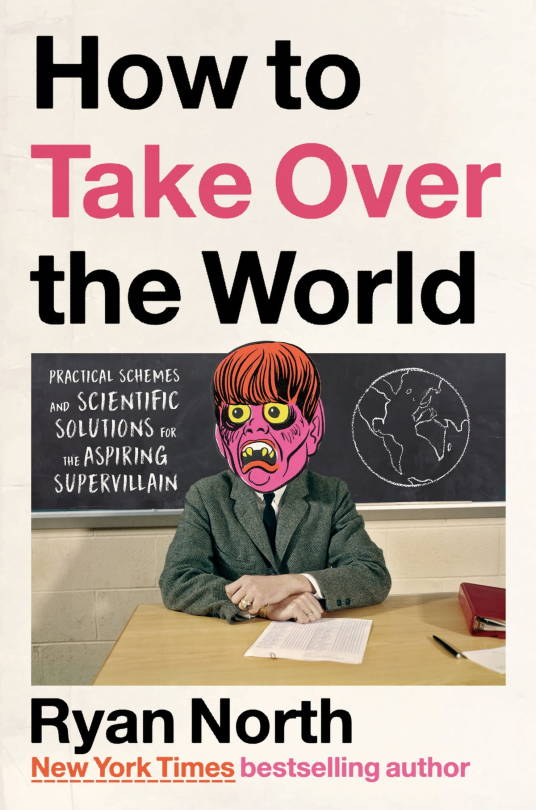
There’s a certain kind of Internet Person who makes the world a better place every day, just by showing up. People like Ryan North, whose many accomplishments include his daily, long-running, brilliant Dinosaur Comics:
https://www.qwantz.com/
The secret to Dinosaur Comics is the simplicity of the bit, coupled with the lengths that North takes it to: it’s the same six stock-art panels of a T-Rex, a Utahraptor and a, Dromiceiomimus, discoursing on some funny, bizarre or philosophical topic. Three times per week, every week since 2003, Ryan North has written new dialog for these three dinosaurs, as T-Rex crushes a log cabin (panel 3) and a tiny person (panel 4), while pondering the imponderable.
Thinking up three different gags per week for the same six panels for nearly 20 years has meant that North has had to go to some very weird and amazing places, really push through all the obvious riffs, and take us beyond the obvious bounds of the imagination.
Now, Dinosaur Comics is all the more amazing in that it is basically a side-hustle and passion project. North has several other careers he pursues, like producing improbable, delightful, wildly popular crowdfunded books. His choose-your-own adventure version of Hamlet was the most successful publishing Kickstarter when it funded:
https://www.kickstarter.com/projects/breadpig/to-be-or-not-to-be-that-is-the-adventure
And then there was “Machine of Death,” a pair of CC-licensed theme anthologies and a card game North co-created, about a world in which people know the exact time and manner of their deaths.
http://machineofdeath.net/
Not only are these great books, they also destroyed Glenn Beck’s 2010 book launch by beating it to the top of the charts, causing Beck to conceive of a bizarre, long-running feud against the “culture of death.”
http://blog.serindu.com/2010/10/28/glenn-beck-thinks-i-celebrate-destruction/
North’s wide-ranging interests and deeply nerdy outlook (he’s also an accomplished computer scientist) makes him perfectly suited to writing superhero comics, and his runs on several Marvel titles are distinguished for their humor and inventiveness:
https://marvel.fandom.com/wiki/Category:Ryan_North/Writer
But beyond the comics, the webcomics, the science fiction and the Shakespeare-inspired remix comedies, North is also an accomplished science communicator. His first book-length foray into the field was 2018’s “How to Invent Everything,” which addressed itself to time-travelers stranded in the past and explained how to bootstrap a technologically advanced civilization as a frame for stripping away the layers of knowledge and art underpinning our everyday lives:
https://www.howtoinventeverything.com/
Now, North has published a sequel of sorts: How to Take Over The World, a popular science book that tours a wide-ranging set of technological ideas by means of explaining how to realize the supervillain plots so beloved of Marvel comics:
https://supervillainbook.com/
HTTOTW is full of extremely funny, extremely informative riffs that make for a engrossing frame for very deep dives into knowledge that is esoteric, interdisciplinary, and damned interesting. For example, if you want to build a supervillain lair, you want to be beyond the reach of state authority, and that’s a jumping-off point to recount the history of nation-states, the deeply flawed nature of seasteading and other “libertarian exit” projects, and, finally, a triumphant exploration of Antarctic treaty law and Buckminster Fuller’s plan for vast, floating spheres, with a detour into carbon nanotubes and other exotic new materials.
HTTOTW gives the same treatment to immortality, bringing back dinosaurs (so you can terrorize your enemies from atop a ferocious thunder-lizard), controlling the world’s weather, traveling through time, switching off the internet, and sending information forward in time to the heat-death of the universe.
For each of these, North presents the hilarious and often terrible histories of previous attempts, the current state of the art, and the outer speculative edge of science. Each one is a way to talk about biology, physics, sociology, and politics — and each one sneakily introduces the book’s main theme, which is that the supervillain’s true, inevitable downfall is their belief in their singular genius and desire to ignore or trample the agency of others.
That message emerges inexorably through North’s expert scientific explanations and often laugh-out-loud humor: supervillains are, basically toddlers who would like very much for everyone to simply let them decide how everything should work, without complaining about their own wants and needs.
At a moment when selfish assholes have decided that the pandemic is over, and other people have no right to demand that they consider how their actions harm others, HTTOTW is a timely reminder that we all have intertwined destinies, and that science and reality have an anti-hyper-individualist bias:
https://twitter.com/mattblaze/status/1515329047785574404
25 notes
·
View notes